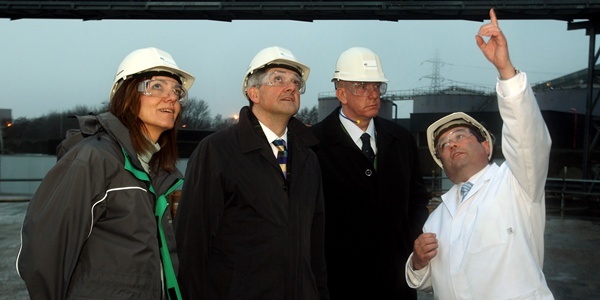UK energy secretary Chris Huhne has said coal-fired power stations such as Longannet are “the future.”
Mr Huhne visited Longannet in west Fife where he saw the work of carbon capture storage (CCS). Earlier, Mr Huhne had travelled to Edinburgh where it was disclosed that the Scottish Government will continue to work with Department of Energy and Climate Change (DECC) to reform electricity markets and secure Scotland’s low carbon future.
Scotland’s finance secretary John Swinney and energy minister Jim Mather met Mr Huhne where they discussed a range of energy issues.
Mr Huhne’s visit to Longannet follows the launch of the government’s consultation on electricity market reform, which set out measures aimed at moving the UK to the front of the global race for electricity investment, driving the growth of clean energy industries in the UK and ensuring the best possible deal for consumers.
The CCS unit has been in operation at Longannet since May 2009. A Scottish-led consortium, which includes Shell and National Grid, is also working on detailed plans for a commercial CCS project at Longannet.
The consortium is the last remaining entrant in a UK Government competition to fund a commercial-scale CCS scheme. There were originally nine.
A technical study will be submitted to the government in the coming months and a funding decision will be made after it is considered.’The future’During his visit to Longannet Mr Huhne spoke of its importance to the energy industry. “Coal-powered stations such as Longannet are the future,” he said.
“I am very pleased to have the opportunity to come and see the carbon capture and storage testing facility at Longannet for myself. CCS has a key part to play in ensuring that we can keep the lights on at the same time as fighting climate change. The International Energy Agency has estimated that globally 3400 CCS plants will be needed by 2050 if we are to meet our critical target of two degrees below pre-industrial levels.
“The UK has the skills and opportunity to lead the world in this technology, which is why in the spending review we committed to investing up to £1bn in CCS. It was very interesting to be shown the process. Longannet is going to be a tremendous project.
“It will be the first CCS project of its kind anywhere in the world and the potential for both the local and national economy is quite astonishing.
“Clean coal and gas are crucial for our future. And we want to keep wind-powered energy going so you need stations such as Longannet where you have surges of demand such as the advertisement break during Coronation Street.”
John Campbell, director of energy wholesale at ScottishPower, said, “The carbon capture unit has been a major success and we were delighted to welcome Mr Huhne to Longannet to see the device in operation.
“The government has expressed their commitment to develop CCS technology in the UK, and prototype projects such as this will help to advance the overall concept and feasibility of larger-scale CCS schemes.”
Mr Swinney said he was pleased Mr Huhne shared the same desire to further harness Scotland’s vast renewables and clean energy potential.’Intransigence’He said, “We discussed the Fossil Fuel Levy, nearly £200 million of Scotland’s money that is still sitting in a London bank account due to the Treasury’s intransigence to release the money as additional spend on renewables for Scotland. I urge the UK Government to deliver a pragmatic solution that accelerates the release of funding for Scotland for renewable energy projects that are ready to go now in Scotland.
“Parliament will tomorrow debate the UK Government’s proposed reforms to the electricity market, which have implications for our powers to support renewables, carbon capture and storage (CCS) and control emissions. We have a strong framework of support in Scotland and we have already said that changes could unnecessarily risk investor confidence, so I again reiterated our desire to see Scotland’s powers maintained or enhanced in the proposed reforms.
“In clean energy technologies, Scotland can become a world leader in carbon capture and storage we have a vast capacity in the North Sea, of European significance, to store emissions from industrial coal-fired plants for the next 200 years.
“CCS offers vast environmental and economic benefits and with our skills and energy expertise, Scotland is the natural home for a carbon capture and storage demonstrator project and I know Mr Huhne will see that potential for himself when he visits Longannet today.”
